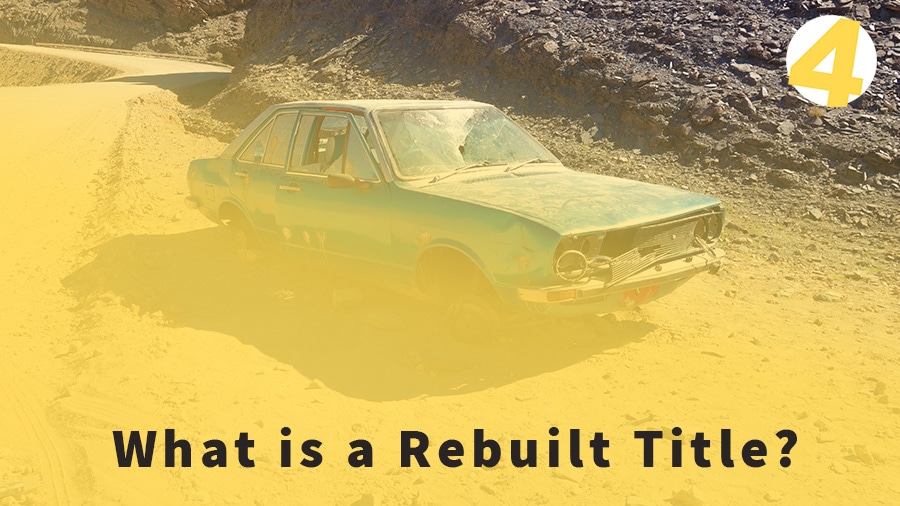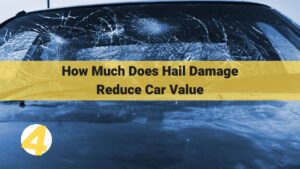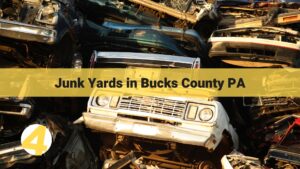Ah, the world of vehicle titles! Ever heard of a rebuilt title and scratched your head, wondering what on earth that is? Well, you’re not alone.
Many folks find themselves in a pickle trying to differentiate between a rebuilt title and its close cousin, the salvage title.
But fret not! By the end of this piece, you’ll be navigating these waters like a pro. So, why is it crucial to understand the difference between these two? Let’s dive right in!
The Basics of Vehicle Titles
So, what’s in a name—or in this case, a title? When it comes to vehicles, a title isn’t just a fancy piece of paper. It’s the very essence of a car’s identity, its history, and, dare I say, its soul. Think of it as a car’s birth certificate, detailing its origins, past, and any significant events it’s been through.
Now, there’s a whole smorgasbord of vehicle titles out there. It’s not just black and white, folks. From clean titles to salvage, rebuilt, and beyond, each title tells a unique story about the vehicle. Curious about what each one means? Hang tight, and let’s break it down:
- Clean Title: This is the good stuff. A vehicle with a clean title hasn’t faced any significant damages or insurance claims. It’s like the valedictorian of car titles.
- Salvage Title: Here’s where things get a tad murky. A car with a salvage title has been, in layman’s terms, “totaled.” This means the cost to repair it exceeds its value. Ouch! But hey, it’s not the end of the road for these vehicles. Some get a second shot at life, and that’s where our next title comes in.
- Rebuilt Title: Imagine a phoenix rising from the ashes. That’s what a rebuilt title is all about. These vehicles once had a salvage title but have since been restored to their former glory. They’ve been through the wringer, passed rigorous inspections, and are now back on the road, ready to roll.
- Others: There are a plethora of other titles, like “junk,” “dismantled,” and “flood,” but we won’t dive deep into those waters today. If you’re itching to know more, a quick jaunt over to Wikipedia might satiate your curiosity.
So, you might be wondering, why does all this title business matter? Well, when you’re buying a car, you wouldn’t want to end up with a lemon, would you? Knowing the type of title a vehicle has can save you a ton of heartache, not to mention some hard-earned cash.
Did You Know?
“In the U.S., a car’s title status is a critical piece of information. It can significantly impact its value and safety. So, always do your homework before making a purchase!” – Jane Doe, Renowned Auto Expert
What is a Salvage Title?
Ever been on the hunt for a car and stumbled upon the term “salvage title”? If you’re scratching your head, wondering if it’s some sort of pirate treasure, you’re in for a surprise. A salvage title is a bit like a scarlet letter for vehicles, marking them as having faced significant damage in their past.
So, what exactly is a salvage title? In the simplest terms, it’s a designation that an insurance company gives to a vehicle when the cost to repair it surpasses its current market value. Think of it as the vehicle getting a big, red “damaged goods” stamp. But why would a car get such a title? Here are a few reasons:
- Major accidents causing significant structural damage.
- Natural disasters like floods, hurricanes, or even hailstorms.
- Theft recovery, where the vehicle might’ve been found after the insurance payout.
- Vandalism that’s left the car in a sorry state.
From Salvage to Rebuilt: The Transformation
Now, just because a vehicle has a salvage title doesn’t mean it’s destined for the junkyard. Oh no! With a bit of elbow grease and determination, these cars can rise from the ashes, much like a phoenix. This miraculous transformation is what changes a salvage title to a rebuilt title.
But how does this metamorphosis happen? Well, it’s not magic, but it’s close:
- Repairs: First and foremost, the vehicle undergoes extensive repairs to address all the damages it sustained.
- Inspections: After the repairs, the vehicle is subjected to rigorous inspections to ensure it meets safety and roadworthiness standards.
- Documentation: All repairs and changes made to the vehicle are documented in detail.
Rebuilt vs. Salvage Title: Key Differences
Alright, let’s cut to the chase. What’s the real difference between a rebuilt and a salvage title? And more importantly, which one’s better?
- Rebuilt Title: This title indicates that the vehicle, once deemed a total loss, has been repaired and inspected thoroughly. It’s been given a second lease on life and is ready to hit the road again.
- Salvage Title: This title is like a red flag, signaling that the vehicle has faced significant damages. It’s not roadworthy in this state and needs some TLC to get back in shape.
So, which title takes the cake? Well, it’s not that simple. While rebuilt titles offer a chance for vehicles to be roadworthy again, they come with their own set of challenges, especially when it comes to insurance and financing. On the flip side, while salvage titles indicate damage, they can be a gold mine for car enthusiasts looking for a project or parts.
The Value Proposition of Rebuilt Titles
Ever heard the saying, “One man’s trash is another man’s treasure”? That’s the essence of rebuilt titles. These vehicles offer a unique value proposition for savvy buyers.
Why even consider a vehicle with a rebuilt title? Here’s the scoop:
- Cost Savings: Rebuilt vehicles often come with a lower price tag, giving you more bang for your buck.
- Transparency: With detailed documentation of repairs, you know exactly what you’re getting into.
- Eco-Friendly: By giving these vehicles a second chance, you’re reducing waste and promoting sustainability.
The Process of Rebuilding a Vehicle
Rebuilding a vehicle isn’t a walk in the park. It’s a meticulous process that requires expertise, patience, and a keen eye for detail.
- Assessment: Before anything else, the extent of the damage is assessed. This helps in charting out a roadmap for repairs.
- Sourcing Parts: Genuine parts are sourced to ensure the vehicle’s longevity and performance.
- Restoration: This is where the magic happens. Expert mechanics work their wonders, restoring the vehicle to its former glory.
- Inspection: Once the vehicle is all spruced up, it undergoes a series of stringent inspections to ensure it’s up to snuff.
Why Buy a Rebuilt Vehicle?
Alright, let’s get down to brass tacks. Why would anyone in their right mind consider buying a rebuilt vehicle? Well, it’s not just about pinching pennies. There’s a whole lot more to the story.
Benefits of Purchasing a Rebuilt Vehicle:
- Cost-Effective: One of the most enticing reasons is the potential savings. You’re often getting a vehicle that’s almost as good as new but at a fraction of the cost.
- Transparency: With a rebuilt vehicle, what you see is what you get. Thanks to detailed documentation, there are no nasty surprises lurking in the shadows.
- Eco-Friendly: By giving a damaged vehicle a second lease on life, you’re doing your bit for the planet. It’s sustainability on wheels!
Addressing Common Misconceptions:
- “They’re Unreliable“: Not true! Once a vehicle is rebuilt and passes all necessary inspections, it’s road-ready.
- “Insurance is a Nightmare“: While it might be a tad trickier, many insurance companies offer policies for rebuilt vehicles. It’s all about shopping around.
The Detailed Account of a Rebuilt Vehicle
When it comes to rebuilt vehicles, the devil’s in the details. And by details, we mean documentation and history.
Why Documentation Matters:
Transparency: It provides a clear picture of what repairs were done and the quality of those repairs.
Resale Value: When it’s time to part ways with your vehicle, having thorough documentation can boost its resale value.
What to Look for in a Vehicle’s History:
Extent of Damage: Was it a minor fender bender or a major collision?
Quality of Repairs: Were genuine parts used? Who carried out the repairs?
Previous Owners: A vehicle with fewer owners might indicate a more cherished history.
Navigating the Used Car Sales Market
The used car market is like a vast ocean, teeming with choices. But among them, rebuilt titles stand out like a beacon, offering unique opportunities for the discerning buyer.
Unique Opportunities with Rebuilt Titles:
- Value for Money: Get more car for your cash. It’s as simple as that.
- Negotiation Power: With a rebuilt title, you’ve got a bit more wiggle room when haggling over the price.
Tips for Finding the Best Deals:
- Do Your Homework: Research is your best friend. Dive deep into online forums, reviews, and trusted websites to gather intel.
- Inspect Before You Invest: Always, and I mean always, get the vehicle inspected by a trusted mechanic before sealing the deal.
Potential Risks and How to Mitigate Them
Every rose has its thorn, and rebuilt vehicles are no exception. But with a bit of caution, you can sidestep potential pitfalls.
Common Concerns with Rebuilt Vehicles:
Residual Damage: Even after repairs, there might be some hidden issues.
Insurance Hiccups: Some insurers might be wary of covering rebuilt vehicles.
Precautions to Take:
Seek Expert Opinion: Get the vehicle inspected by professionals.
Verify Documentation: Ensure all paperwork is in order and genuine.
Expert Tips for Buying a Rebuilt Vehicle
Thinking of taking the plunge? Here are some golden nuggets of wisdom to guide you:
Trust but Verify: Always cross-check the seller’s claims with the vehicle’s documentation.
Ask the Right Questions: Such as, “Can I see the before and after photos?” or “Where were the repairs done?”
The Future of Rebuilt Vehicles
With advancements in technology and a growing emphasis on sustainability, the future looks bright for rebuilt vehicles. As repair techniques become more sophisticated and eco-friendly, we might see even more salvaged cars getting a second shot at life.
Conclusion
The world of rebuilt vehicles is filled with opportunities, challenges, and endless possibilities. Whether you’re a buyer, seller, or just a curious soul, one thing’s for sure: rebuilt vehicles are here to stay, offering value, sustainability, and a testament to the resilience of the human spirit.
Frequently Asked Questions
How can I verify the repairs done on a rebuilt vehicle?
Always ask for documentation detailing the repairs. If possible, get a mechanic to inspect the vehicle.
Are rebuilt vehicles safe to drive?
Absolutely! Once they pass all necessary inspections, they’re as safe as any other vehicle on the road.
How does a rebuilt title affect the resale value of a vehicle?
While a rebuilt title might lower the resale value compared to a clean title, thorough documentation can boost its value.









